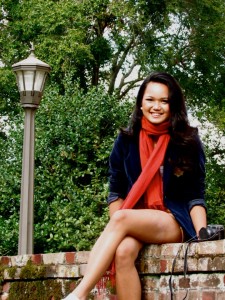I grew up a military brat. My father, a naval officer, was stationed in different areas of the country throughout my childhood. I moved around a lot, meaning new schools, new friends and, in my case, an ever-changing understanding of my Fil-Am identity. Growing up in San Diego, I was surrounded by a majority Fil-Am community. According to a study, there were 144,234 Pilipinos in San Diego County in 2009. That is over 44% of the entire Asian population in San Diego, CA. Needless to say, my experience in SD wasn’t any different. I went to church with Pilipinos. I went to an arts academy with Pilipinos. I joined a traditional dance troupe with Pilipinos. Looking back, I didn't realize that I was part of both the minority in the larger US population, as well as the military brat subculture.
My father was later stationed in Pensacola, FL; thus began the big move to the Gulf Coast. This was a complete culture shock for me; there were only a handful of Fil-Ams with whom I went to school in Pensacola. I did well in school, and suddenly was referred to as an Asian nerd. I was hurt by this label; where I came from in San Diego, I had always been on par with the "norm." I also felt alienated from by childhood friends back in California. I began to distance myself from friends in San Diego when an old pal called me “whitewashed,” having learned that I made friends with my Caucasian and African American classmates. That’s when I realized that racism within the Fil-Am community was just as present as the hostility we receive from beyond our own ethnic group.
I started high school in Virginia Beach, as my dad received orders to work in Norfolk, VA. Here, there were many Fil-Ams at the school, but I found it even more difficult to join the community. Many of my peers had grown up together; they had lifestyles and inside jokes I did not know how to be a part of it all. So, I sought out other circles of friends. I found a safe haven with the field hockey team, golf team, literary art magazine and friends I made in my classes. I shied away from Fil-Ams simply because I felt out of place. It wasn’t until college that I joined a Fil-Am student group, rejoining a social circle of other Fil-Ams. I was more mature and interested in learning about the culture. I wanted to be engaged in the global community of the Philippine diaspora.
I was fortunate enough to attend one elementary school, one middle school and one high school before going off to college. My brothers and sister were not so lucky; they’ve attended several different schools just because of my dad’s orders to other ships and naval bases. But, don’t get me wrong: I am extremely grateful that my father joined the US Navy in order to ensure a better life for me and my family. He met my mother in the States, and has since become quite a successful officer in the military. My parents have made many sacrifices to give my siblings opportunities in the US. For that, I am truly blessed.
We military brats may seem to have the best of both worlds. Starting fresh and making new friends can be exhilarating. We learn to be worldly individuals. However, this process can also be quite challenging when you’re a kid. We have a hard time keeping friends after moving away, and can find ourselves in a pool of jealousy when we encounter people who have lived in the same house for most of their lives.
Being a Pilipina military brat has taught me to be adaptive. The brat subculture has taught me to be flexible and open to change. It can be challenging, but it is also a blessing. To all other military brats, I wish you stability and love within a welcoming community. You are certainly not alone.
Photo Credit: Stephen Salpukas


